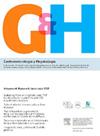Evaluación de la calidad de vida de los pacientes con enfermedad inflamatoria intestinal
IF 2.2
4区 医学
Q3 GASTROENTEROLOGY & HEPATOLOGY
引用次数: 0
Abstract
Introduction
Ulcerative colitis (UC) and Crohn's disease (CD) are diseases that cause a significant impact on patients’ quality of life. The aim of this study is to assess the impact of inflammatory bowel disease (IBD) on health-related quality of life (HRQoL).
Material and methods
Observational, descriptive, cross-sectional study, carried out at Torrecárdenas Hospital (Almería). Patients over 14 years of age diagnosed with CD or UC were included. For the assessment of HRQoL, the reduced 9-item IBDQ-9 questionnaire was used.
Results
106 patients with a mean age of 44 years were included, with a female predominance. Forty-five percent of the patients in the sample had UC compared to 55% with CD. Of the patients, 69.8% were in clinical remission. The median questionnaire score was 60.8 points out of 100. Statistically significant differences were observed between sexes, with worse HRQoL for females. No differences were observed between patients with UC and CD. Differences were also detected between patients who underwent surgery and those who did not.
A negative association was observed between the number of flares and the questionnaire score.
Conclusions
In our study population, there is an acceptable HRQoL, with no differences observed between CD and UC. Female sex, absence of clinical remission, number of previous outbreaks, and surgery have a negative association with HRQoL.

评估炎症性肠病患者的生活质量。
导言:本研究旨在评估炎症性肠病(IBD)对健康相关生活质量(HRQoL)的影响:观察性、描述性、横断面研究,在托雷卡德纳斯医院(阿尔梅里亚)进行。研究纳入了 14 岁以上被诊断为 CD 或 UC 的患者。在评估 HRQoL 时,使用了简化的 9 项 IBDQ-9 问卷:结果:共纳入 106 名患者,平均年龄为 44 岁,其中女性居多。样本中 45% 的患者患有 UC,而 55% 的患者患有 CD。调查问卷的中位数为 60.8 分(满分 100 分)。性别差异具有统计学意义,女性的 HRQoL 更差。UC 和 CD 患者之间没有差异。接受手术治疗和未接受手术治疗的患者之间也存在差异:在我们的研究人群中,患者的 HRQoL 可以接受,CD 和 UC 患者之间没有差异。
本文章由计算机程序翻译,如有差异,请以英文原文为准。
求助全文
约1分钟内获得全文
求助全文
来源期刊

Gastroenterologia y hepatologia
GASTROENTEROLOGY & HEPATOLOGY-
CiteScore
1.50
自引率
10.50%
发文量
147
审稿时长
48 days
期刊介绍:
Gastroenterology and Hepatology is the first journal to cover the latest advances in pathology of the gastrointestinal tract, liver, pancreas, and bile ducts, making it an indispensable tool for gastroenterologists, hepatologists, internists and general practitioners.
 求助内容:
求助内容: 应助结果提醒方式:
应助结果提醒方式:


